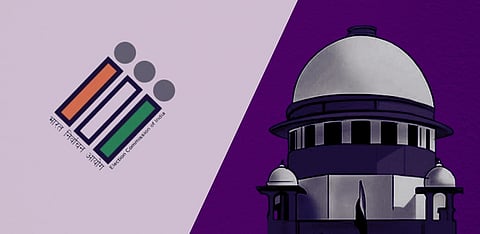

THE SUPREME COURT ON TUESDAY sought a response from the Election Commission of India (‘ECI’) on petitions challenging the constitutional validity of its October 27 notification ordering the Special Intensive Revision (‘SIR’) of electoral rolls in Tamil Nadu and West Bengal, among other States. The petitions allege that the exercise violates Articles 14, 19, 21, 325, and 326 of the Constitution.
The October 27 notification marked the commencement of the second phase of the SIR of electoral rolls across 12 States and Union Territories (‘UTs’)— Andaman and Nicobar Islands, Chhattisgarh, Goa, Gujarat, Kerala, Lakshadweep, Madhya Pradesh, Puducherry, Rajasthan, Tamil Nadu, Uttar Pradesh, and West Bengal.
Issuing notice to the ECI, the Supreme Court granted two weeks’ time for its response and posted the matter for further hearing on November 26, 2025.
A Bench of Chief Justice-designate Justice Surya Kant and Justice Joymalya Bagchi also directed High Courts to keep pending petitions in abeyance that concern the legality of the SIR in these States as well as in Bihar.
“Since this Court is seized of matters relating to the legality of SIR of electoral rolls in various States including Bihar, West Bengal, Tamil Nadu, and Puducherry, … we request the jurisdictional High Courts to keep in abeyance or defer the writ proceedings, if any, filed before them challenging the validity of SIR in their respective States,” the Bench said in its order.
The Bench allocated two hours for arguments on interim relief, with Tamil Nadu and West Bengal collectively receiving one hour and fifteen minutes, and the ECI allotted forty-five minutes to present its case.
The Court scheduled detailed hearings for November 26 and 27, when the ECI will first defend the legality of the SIR process—initiated in Bihar and later extended to 12 States and UTs—followed by arguments from the petitioners questioning its constitutional validity.
In addition to the Tamil Nadu and West Bengal petitions, the Court also issued notice on an application filed by the Association for Democratic Reforms (‘ADR’), which seeks several directions to ensure greater transparency in the preparation of electoral rolls and compliance with the ECI’s own procedural guidelines. This application will also be heard on November 26, 2025. The ECI will respond to this application by NGO ADR by November 24.
As advocate Prashant Bhushan, appearing for ADR, read out the directions sought, Justice Surya Kant remarked, “You are seeking compliance of their (EC’s) own instructions.”
When Bhushan voiced concern over the pace and manner of the revision exercise, Justice Kant observed, “If we are satisfied, we will annul the exercise.”
Appearing for the Dravida Munnetra Kazhagam (‘DMK’), Senior Advocate Kapil Sibal highlighted the practical challenges in Tamil Nadu during this period. “The situation in different States is different. In Tamil Nadu, there will be heavy rains in November and December. The BLOs will also be engaged in flood relief. December and January are harvesting months, and Christmas vacations will follow. This period is not conducive for proper participation in the enumeration process,” he told the Bench.
Responding, the Court noted that the electoral rolls had been revised several times before, but reminded the ECI that it must “keep in mind the local conditions of each State.”
Sibal pointed out that unlike the current exercise, the SIR in 2002 had been carried out over a much longer duration, allowing for greater accuracy and public participation.
The Supreme Court is already seized of multiple petitions challenging the SIR in Bihar and other States.